- 1. The German Alphabet has 4 extra letters
- 2. You can sing the German Alphabet but it sounds very different
- 3. WT*?!: V is W but sounds like F
- 4. There is (technically) no limit to how long German words can get
- 5. The most common letter is “E”
- 6. German has its own Spelling Alphabet
- 7. (Some) Consonants Are Hard As Steel
- 8. These Sentences Contain the Whole German Alphabet
- 9. The Most Common Word is “der”
Have you ever wondered why some German words seem to go on forever and what these strange dots over the vowels mean?
While many people may be familiar with the English alphabet, the German alphabet has several distinct features.
In this post, we will explore nine fun facts about the German alphabet, highlighting its history, pronunciation, and special characters. Whether you are a language enthusiast or simply curious about the German language, this is a great place to begin.
So, let’s dive in and look at 9 fun factoids!
1. The German Alphabet has 4 extra letters
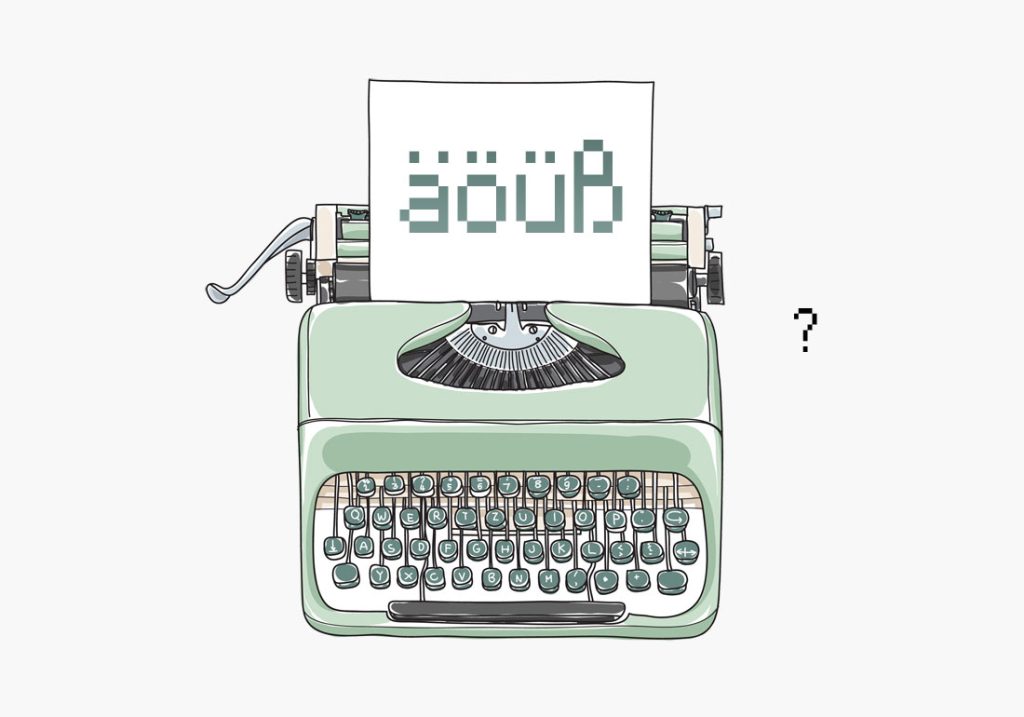
The German alphabet uses the same 26 letters like the English alphabet, but there are 4 extra letters: ä, ö, ü (so-called Umlaute) and ß which is known as “ess-zett” or “scharfes S” (“sharp S”).
While the Umlaute are just variations of the common vowels a, o and u, the letter ß is unique to the German language. It sounds like the “ss” sound in “hiss” and is used for every “sharp s” sound after a long vowel. For example: “das Maß” (measure), but “die Masse” (mass). In Swiss German the ß is not being used and always replaced by “ss”.
The history of German umlauts can be traced back to the Old High German period, which spanned from the 6th to the 11th century. During this time, vowel sounds in German words underwent a process of change, which involved the fronting of vowels in stressed syllables. This led to the creation of new vowel sounds.
👉 The Umlaut was named by the linguist Jacob Grimm, one of the famous Grimm Brothers. It literally translates to “around sound”.
Over time, the umlauted vowels became a standard part of the German alphabet, and they continue to be an essential feature of the language to this day. The umlauts not only add unique sounds to German words but also affect their meaning, making them an essential aspect of the language for learners to master.
Here’s a quick overview:
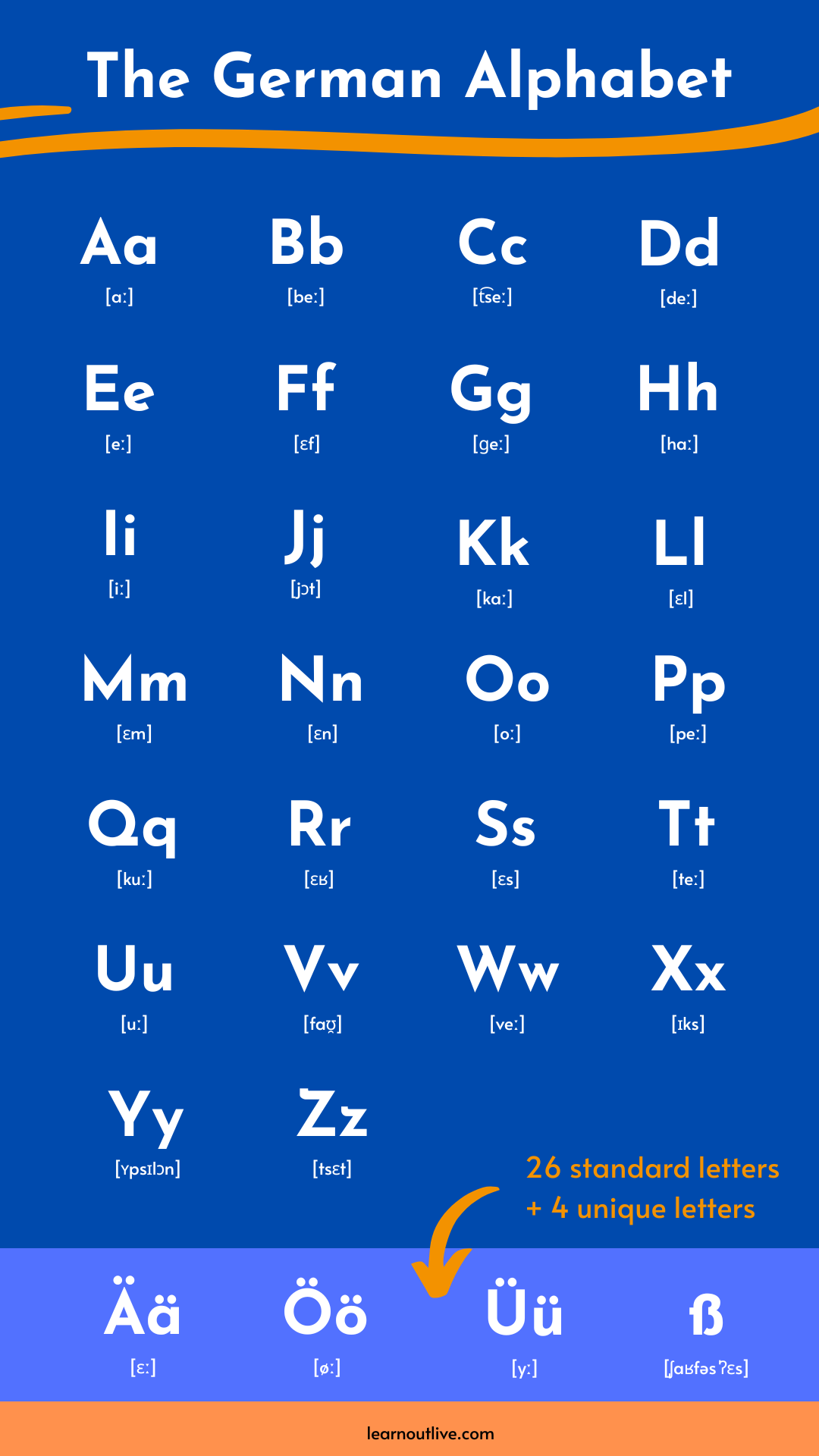
If you don’t own a physical German keyboard you can still type the special letters by installing a German keyboard on your phone or computer. Alternatively you can also spell ö as oe, ä as ae, or ü as ue.
2. You can sing the German Alphabet but it sounds very different
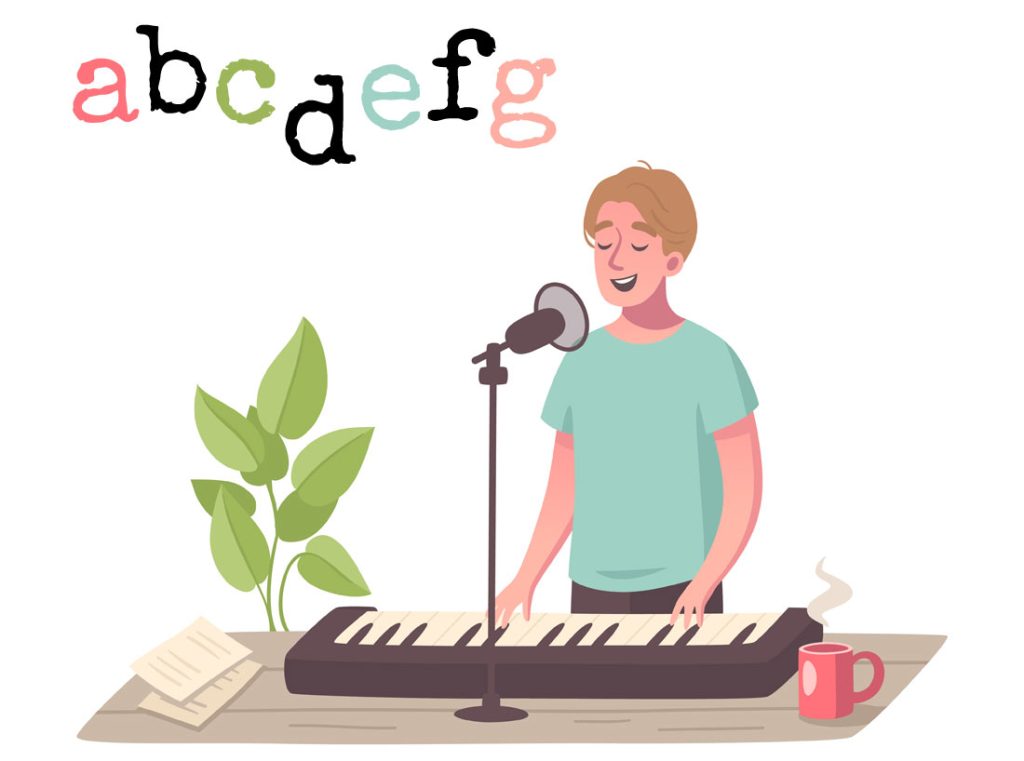
While the melody is the same, you’ll notice that almost all of the letters have different names than in English. There are many variances, but here is a common pattern: all the letters that have a name ending with “ee” in English, have the ending “eh” in German. For example, the letter B (bee) sounds like “beh”, P (pee) sounds like “peh” in , D (dee) becomes “deh”, etc.
And then there are those letters that have completely different names: H (age) becomes “hah”, J (jay) becomes “yott”, W (double-you) becomes “veh”, V (vee) becomes “fow” (as in “fowl”), the letter Y (why) becomes “ipsilon” and so on and so forth.
The only letters that have the exact same names in English and German are: F, L, M, N, S.
The names for letters in the English and German alphabet differ due to the historical evolution of each language. The English language has been influenced by a variety of languages, including Latin, French, and Germanic languages.
As a result, the names for English letters are often derived from multiple sources, with some letters having Latin origins, while others are based on the French or Germanic languages. In contrast, the German language has a more consistent and structured approach to naming letters, which is based on the pronunciation of each letter.
3. WT*?!: V is W but sounds like F

Did you ever notice that when Germans speak English, they’ll pronounce words such as waiter like “vaiter” and we like “vee”? As funny as this German accent may sound, there’s actually a reason for that. In German the letter W is always pronounced like the V in English.
For example the German word wunderbar is correctly pronounced like “voonderbar”. Similarly, many English speakers will pronounce the car manufacturer Volkswagen “volksvagon” but the correct pronunciation sounds more like “folksvahguhn”.
Additionally, the letter V in German is often pronounced like F in English. So a word like Vater (father) is pronounced like “fahturr”.
4. There is (technically) no limit to how long German words can get
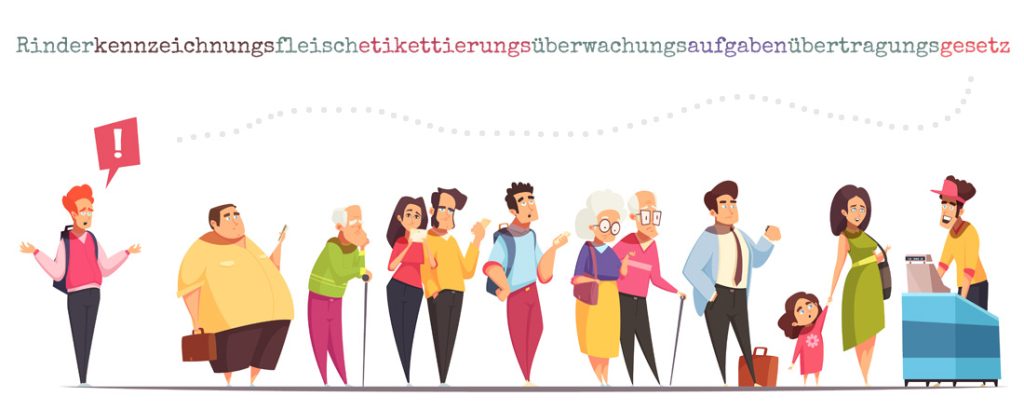
Thanks to the German language’s love for compound nouns, words can get very long very quickly. Technically there is no limit to how many words you can string together. In the wild you’ll find most of these compound monsters in the realms of legalese and officialese.
The Duden dictionary has the following unwieldy words from the Dudenkorpus (digital database of editors) on their top 2:
Rinderkennzeichnungsfleischetikettierungsüberwachungsaufgabenübertragungsgesetz
(pronunciation by Tosca via Wikimedia, GNU)
literally “Cattle marking and beef labeling supervision duties delegation law”
Grundstücksverkehrsgenehmigungszuständigkeitsübertragungsverordnung
(pronunciation by Jeuwre via Wikimedia, CC BY-SA 4.0)
literally: “regulation on the delegation of authority concerning land conveyance permissions”
As long as these words may get though, there is an iron rule. The last element of these compound nouns is what determines the gender of the whole beast. Hence, the first example would be neuter das Rinder……gesetz because it’s das Gesetz, and the second female: die Grundstücks….verordnung because it’s die Verordnung.
In German, nouns can be combined to create new compound words, which often result in longer words that can seem daunting to non-native speakers. The use of compound words in German can be traced back to the Middle High German period, when writers and poets used them to create new and imaginative words.
Over time, compound words became a standard feature of the German language, with words like “Donaudampfschiffahrtsgesellschaftskapitän” (Danube steamship company captain) becoming a famous example of the long compound words used in German.
5. The most common letter is “E”
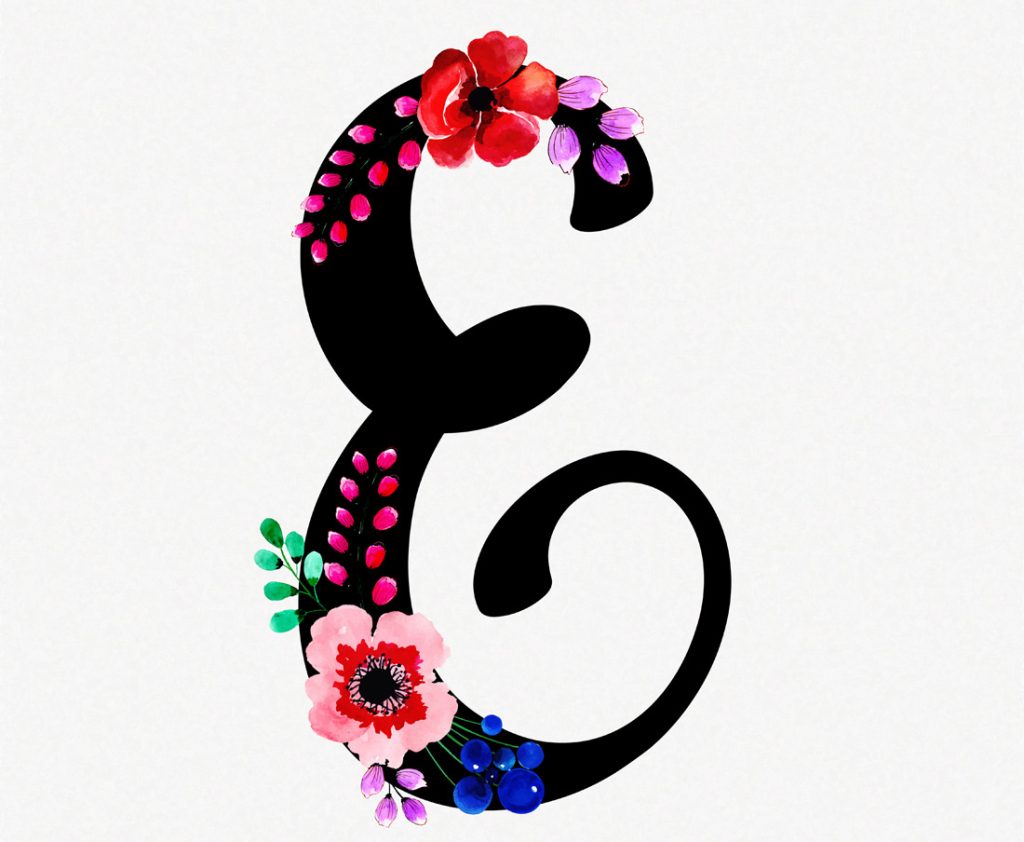
Here’s another thing the German alphabet shares with the English one: the most common letter is E.
However if you look at the frequency charts side by side, the other letters in the top 5 vary greatly in both languages:
| German | English | |
|---|---|---|
| 1. | E | E |
| 2. | N | T |
| 3. | I | A |
| 4. | S | O |
| 5. | R | I |
6. German has its own Spelling Alphabet

Some letters just sound too similar; when you need to spell a word and want to make absolutely sure that letters aren’t misheard, for example over the telephone, there’s a special spelling alphabet that replace each letter with a clearly distinguishable word, such as Bravo for B, and Foxtrot for F in the NATO phonetic alphabet.
In German we call this a Buchstabiertafel or Buchstabieralphabet, and there’s a unique set of names for each letter/sound:
| Letter | Word |
|---|---|
| A | Anton |
| B | Berta |
| C | Cäsar |
| D | Dora |
| E | Emil |
| F | Friedrich |
| G | Gustav |
| H | Heinrich |
| I | Ida |
| J | Julius |
| K | Kaufmann |
| L | Ludwig |
| M | Martha |
| N | Nordpol |
| O | Otto |
| P | Paula |
| Q | Quelle |
| R | Richard |
| S | Siegfried |
| T | Theodor |
| U | Ulrich |
| V | Viktor |
| W | Wilhelm |
| X | Xanthippe |
| Y | Ypsilon |
| Z | Zeppelin |
Interestingly this phonetic alphabet used to look very different before the year 1934. Under the reign of the national-socialists, anything that didn’t confirm to their arbitrary ideas of “racial purity” was deleted from the spelling alphabet and replaced with more “Germanic-sounding” names.
Originally, D was “David”, J was “Jakob”, N was “Nathan”, S was “Samuel” and so on and so forth, which are of course all Hebrew names from the Bible.
There have been some recent attempts to restore the old German spelling alphabet and/or replace the letters with city names, but in daily life German speakers will often just use a mix of both the old and the new versions. Switzerland on the other hand, who didn’t fall under the same dark spell, still largely uses the old spelling alphabet until this day.
7. (Some) Consonants Are Hard As Steel
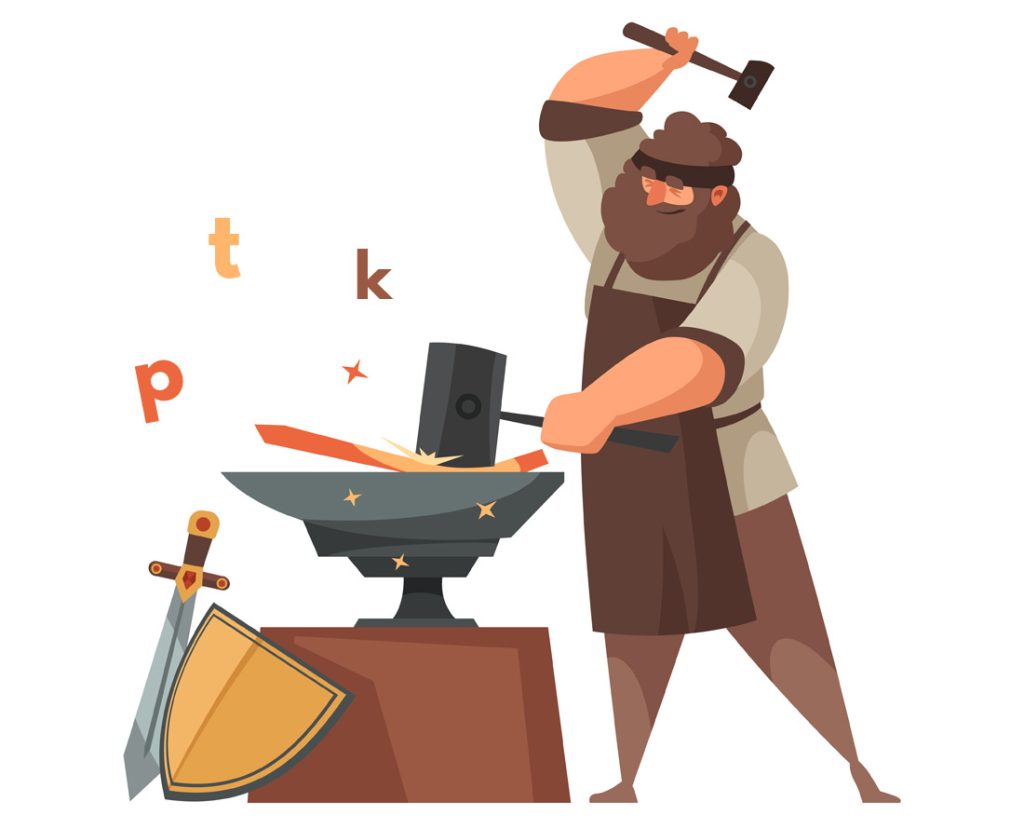
It’s a common stereotype that German sounds “harsh” and “tough”, and while that’s not necessarily true, there is in fact a very specific phenomenon where consonants get toughened up when they appear at the end of a word.
We call this “Auslautverhärtung” (literally: “end sound hardening”). Put simply it means that each B, D, G at the end of a word turns into P, T, K. It is an absolute rule which is never broken.
Let’s look at some examples:
der König (king) sounds like -> Könik
gelb (yellow) sounds like -> gelp
das Bild (picture) sounds like -> Bilt
This is why many German speakers often struggle when pronouncing English words with soft plosives at the end. Hence, kid will become kit, dog becomes doc, sophisticated becomes sophisticatet, and so on and so forth.
The historical origins of Auslautverhärtung can be traced back to the Old High German period, which spanned from the 6th to the 11th century. During this time, consonants at the end of Germanic words became voiceless, a process known as Auslautverhärtung or “final devoicing.”
This change in pronunciation was likely influenced by the contact between Germanic tribes and the Romance-speaking peoples in the area, as Romance languages frequently use voiceless consonants at the end of words.
Over time, Auslautverhärtung became a standard feature of the German language, and it remains an essential aspect of modern German pronunciation. Understanding the historical origins of Auslautverhärtung can be helpful for learners in mastering the correct pronunciation of German words.
8. These Sentences Contain the Whole German Alphabet

Maybe you’ve stumbled over the sentence “The quick brown fox jumps over the lazy dog”. This is a so-called pangram of the English language, i.e. a sentence that contains all letters of the English alphabet. Here are some fun German pangrams:
First, let’s look at those containing all 26 letters without ß and ä,ö,ü:
“Jeder wackere Bayer vertilgt bequem zwo Pfund Kalbshaxen.”
Translation: “Every valiant Bavarian comfortably devours two pounds of veal shank.”
“Bei jedem klugen Wort von Sokrates rief Xanthippe zynisch: Quatsch!”
Translation: “To every wise word of Sokrates, Xanthippe cynically shouted: Nonsense!”
Now, let’s up our game and add the other 4 special letters:
“Zwölf laxe Typen qualmen verdächtig süße Objekte”
Translation: “Twelve easy-going dudes puff suspiciously sweet objects.”
“Falsches Üben von Xylophonmusik quält jeden größeren Zwerg.”
Translation: “The wrong practice of xylophon-music tortures every larger dwarf.”
9. The Most Common Word is “der”
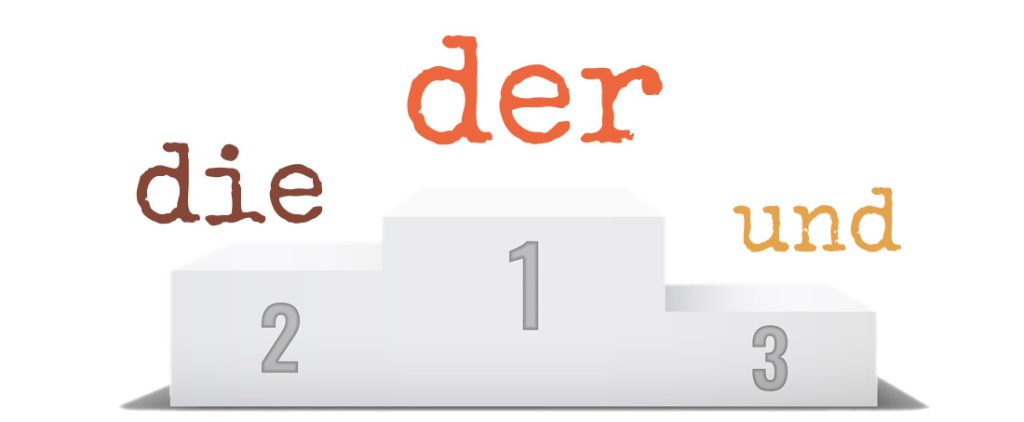
The most common word formed by letters in the English language is “the”. Similarly, in German it’s the definite article “der”, followed by “die” and “und”. Interestingly the neuter definitive article only appears on place 8 in the frequency chart.
–

